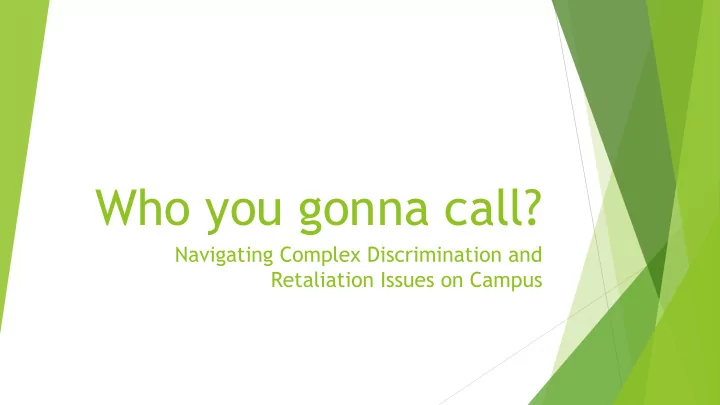

Who you gonna call? Navigating Complex Discrimination and Retaliation Issues on Campus
Ms. Congeniality? Professor X has been a faculty member with the department for many years. She has always had difficulty working well with others but over the last three years her rude and abrasive behavior toward others has generated several complaints from both faculty and staff. There has also been significant turnover among the support staff, some of whom cited a hostile environment as a reason for leaving the department. Professor X was recently overheard telling a staff member that she was giving her a task that any trained monkey should be able to complete in less than an hour.
Nondiscrimination requirements under Title VII, ADEA, and University Policy University policies and the federal laws on which they are based prohibit ▶ discrimination based on a number of protected statuses, including but not limited to race, sex, religion and age. Discriminatory harassment is a form of discrimination prohibited by law and ▶ University policy. Elements: Unwelcome conduct based on Actual or Perceived Membership in Protected Group ▶ Conduct is Sufficiently Severe or Pervasive to Gave Rise to a Hostile Working ▶ Environment or to Effectively Deny Students the Benefit of or Access to their Education The Harassment would have the Same or Similar Effect on a Reasonable Person in ▶ the Circumstances
Workplace Violence Policy Prohibits Workplace Violence, including but not limited to Bullying, ▶ Intimidation, and Threats, as defined by the policy Bullying is unwanted offensive and malicious behavior that undermines or attempts ▶ to undermine an individual or group through persistently negative actions. Bullying typically includes an element of vindictiveness, and the behavior is calculated to undermine, patronize, humiliate, intimidate or demean the recipient. Intimidation is engaging in actions intended to frighten, coerce, or induce duress. ▶ Threat is the expression of intent to cause physical or mental harm. Such an ▶ expression constitutes a threat without regard to whether the party communicating the threat has the present ability to carry it out and without regard to whether the expression is contingent, conditional or future. Does not Require Establishing Conduct was based on Membership in Protected ▶ Group
Campus Resources UNC Charlotte Nondiscrimination Policy: ▶ http://legal.uncc.edu/policies/up-501 UNC Charlotte Workplace Violence Policy: ▶ https://legal.uncc.edu/policies/up-101.17 Contacts: ▶ For questions about responding to employee reports: ▶ http://hr.uncc.edu/employee-relations (staff); http://provost.uncc.edu/academic-budget-personnel (faculty) For questions about responding to student reports: http://unccdso.uncc.edu/ ▶
Team Building Exercise Following a number of recent departures in your department, a notice that course load requirements will be increased, and a state-imposed salary freeze, you hear from a number of faculty in your department that morale has plummeted. A group of faculty members suggests that the department schedule a mountain retreat to focus on renewed departmental goals and restructuring and to encourage faculty to share their concerns openly in a neutral environment. A date is set and reservation requests go out to all department faculty; the agenda includes guided hiking tours, a kayak trip, and a campfire chat. One faculty member does not respond to your repeated reservation requests and later shares with you, a day before the scheduled retreat, that he is having back trouble again and doesn’t think he can make it.
Faculty Supervisor Responsibilities under the ADA, the Rehabilitation Act, and applicable University Policies Federal law and applicable university policy require that the University provide ▶ equal access to employees and students with disabilities to University programs and activities and further require that the University provide reasonable accommodations to employees and students with disabilities in order to ensure such access. The term “disability” means (A) a physical or mental impairment that substantially ▶ limits one or more major life activities of such individual. Major life activities include, but are not limited to, caring for oneself, performing ▶ manual tasks, seeing, hearing, eating, sleeping, walking, standing, lifting, bending, speaking, breathing, learning, reading, concentrating, thinking, communicating, and working. Major life activities also include the operation of major bodily functions, including but not limited to, functions of the immune system, normal cell growth, digestive, bowel, bladder, neurological, brain, respiratory, circulatory, endocrine, and reproductive functions
Campus Resources UNC Charlotte policies prohibiting discrimination and outlining the ▶ University’s responsibility to respond to disclosures of disability status:http://legal.uncc.edu/policies/up-501.1 Contacts ▶ For questions about responding to employee reports: Jeanne Madorin, ADA ▶ Coordinator for Faculty/Staff Executive Director of Human Resources for EPA Non-faculty Administration, Employee Relations, and Compliance, 113 King, (704) 687-0659, jlmadori@uncc.edu For questions about responding to student reports: Gena Smith, ADA Coordinator ▶ for Students/General Public Director of Disability Services, Fretwell 230, (704) 687-0046, Gena.Smith@uncc.edu
It’s My Party Following a protracted investigation, the University issued a decision finding that there was insufficient evidence to conclude that Professor X in your department was sexually harassed by Professor Y. During the course of the investigation, Professor X sent an email to the entire department outlining his complaint and his concerns about the University’s inaction in response to his complaint. Prior to receiving notice about the harassment complaint, you asked Professor X to organize the department’s annual holiday gathering. You now learn that she did not invite Professor Y. The shunned Professor Y lets you know that he has not been invited and asks if you plan to attend.
Retaliation under Title VII and University policies University policy and applicable federal law strictly prohibit retaliation ▶ against individuals who bring or cooperate in the University’s investigation of complaints alleging violations of the University’s nondiscrimination policies. In order to be considered actionable, the allegedly retaliatory action must be ▶ reasonably likely to dissuade an employee from engaging in a protected activity, such as filing a good faith complaint or cooperating in the investigation of any such complaint. Actionable retaliation may include work-related and non-work-related ▶ actions.
Campus & EEOC Resources Policy prohibiting retaliation, including internal links to applicable ▶ complaint/grievance procedures: http://legal.uncc.edu/policies/up-803 EEOC guidance regarding actionable retaliation under Title VII: ▶ https://www.eeoc.gov/laws/guidance/retaliation-guidance.cfm
Recommend
More recommend